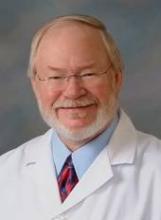ATLANTA – Indacaterol significantly improves bronchodilation and health status in patients with chronic obstructive pulmonary disease, and is safe and well tolerated, according to findings from studies presented at the annual meeting of the American College of Chest Physicians.
In a pooled analysis of efficacy and safety data from two randomized controlled studies, the inhaled long-acting beta2-agonist bronchodilator given at the approved dose of 75 mcg daily was found to be of benefit regardless of age, sex, smoking status, or severity of airflow limitation. In another analysis of pooled data, treatment was shown to have an acceptable cardiovascular and cerebrovascular safety profile.
The efficacy analysis included 640 patients from two identically designed studies who were randomized to receive indacaterol or placebo for 12 weeks. Trough (24 hours post dose) forced expiratory volume in 1 second (FEV1) improved by least-squares mean differences of 150 and 110 mL among men and women, respectively; by 110 and 150 mL among those under age 65 and those aged 65 or older; by 150 and 110 mL among those with moderate and severe airflow limitation; and by 140 and 130 mL in ex-smokers and current smokers, Dr. Thomas Siler of Midwest Chest Consultants in St. Charles, Mo., reported.
Health status scores, as measured using the St. George’s Respiratory Questionnaire, improved similarly in men and women (by 3.8 and 3.7 units, respectively), and also improved in all of the other groups. Improvement was greater, however, in those aged 65 years and older (by 4.5 units vs. 3.3 units in those under age 65), those with severe airflow limitation (by 4.6 units vs. 3.3 units in those with moderate airflow limitation), and in ex-smokers (by 4.1 vs. 3.5 units in current smokers).
Adverse events occurred in 44%-57% of patients receiving indacaterol and in 40%-48% of patients receiving placebo. More adverse events in both groups occurred in older patients, women, those with moderate disease, and ex-smokers.
Patients in this study had a mean age of 63 years, and a mean post-albuterol FEV1 of 54% predicted. About 40% were receiving inhaled corticosteroids.
The findings suggest that indacaterol can be successfully used to treat a range of COPD patients, Dr. Siler concluded. Treatment can be expected to lead to "substantial and worthwhile improvements in bronchodilation and health status," he added.
According to findings from a separate analysis of pooled data from nearly 2,500 patients, these improvements come without an increase in the risk of cerebro- and cardiovascular adverse events (CCV AEs).
The overall frequency of CCV AEs was similar in 449 patients treated for up to 3 months and 2,012 control patients who received placebo (2.0% and 2.58%, respectively), and no type of CCV AE occurred in more than 2 patients in the active treatment group, Dr. James Donohue reported.
Serious CCV AEs occurred in 2 patients in the treatment group and 13 in the placebo group, and an Antiplatelet Trialists’ Collaboration (APTC) event (a cerebrovascular accident not believed to be related to study treatment) occurred in 1 patient in the treatment group, compared with 8 patients in the control group, said Dr. Donohue of the University of North Carolina, Chapel Hill.
The overall frequency of patients with CCV AEs in a 6-month study population ranged from 3.3% to 5.8%, and no dose-response relationship was seen between the 75-mcg dose and up to 600 mcg daily for CCV AEs.
No deaths were reported in those receiving indacaterol 75.
These findings, which used pooled data from previous studies and a database of U.S. and Canadian patients, indicate that indacaterol given at the 75-mcg dose has an acceptable CCV safety profile in patients with moderate to severe COPD, Dr. Donohue said.
When considered in the context of the efficacy data, the findings should be very reassuring to clinicians, he concluded.
The studies included in the safety analysis were sponsored by Novartis. Dr. Donohue and Dr. Siler reported financial relationships with Novartis, which makes indacaterol, as well as with other industry companies. Dr. Donohue reported receiving fees for consulting and/or serving on speakers bureaus or advisory committees for Novartis, GSK, Boehringer-Ingelheim, and other companies. Dr. Siler reported receiving grant monies from GSK, Novartis, Boehringer-Ingelheim, and other companies. He also reported receiving fees for consulting, serving on speakers bureaus, and/or serving on advisory committees for Boehringer-Ingelheim, AstraZeneca, and Forest Research Institute.


